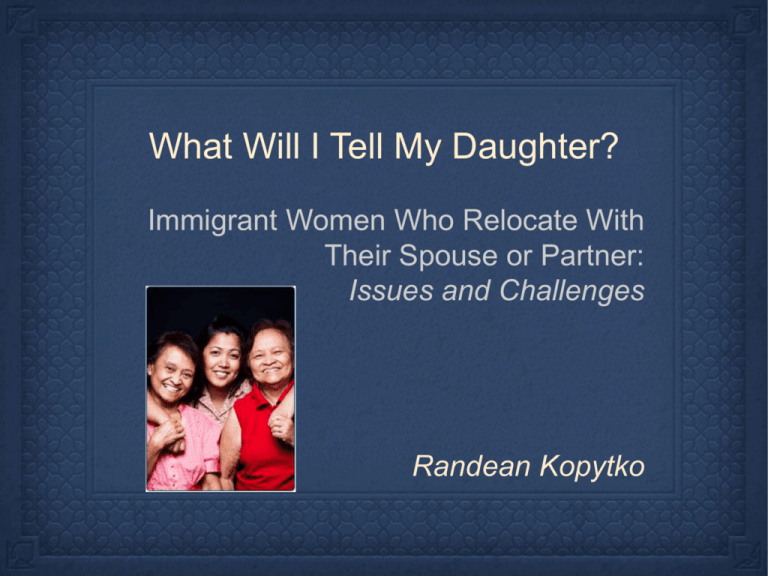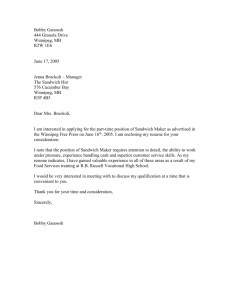R. Kopytko presentation
advertisement

What Will I Tell My Daughter? Immigrant Women Who Relocate With Their Spouse or Partner: Issues and Challenges Randean Kopytko Overview Canadian Immigration Specific Challenges Randean’s Immigration History Employment Rationale & Methodology Social Interaction Childcare/ Schooling Research Questions Successes Case Studies Conclusion & Questions Making Every Connection Matter Provincial Nominee Program Increase number of skilled newcomers Promote immigration Settle in small urban and rural areas My Journey Winnipeg, Scotland, Winnipeg, New Hampshire, Vermont, & Winnipeg . Return to Winnipeg Employed with Military Family Resource Centre Adult English as a second language Neighbourhood Immigrant Settlement Worker Rationale Experiences of principal applicants comprehensively documented (Carter, Pandey, Townsend, 2010) experiences of women who immigrated to Manitoba with or for their partner or spouse has garnered less consideration & research Aim to explore the struggles and successes that women face when they relocate to Manitoba with the intention of informing education and settlement services for women Methodology Qualitative Case Studies Semi-Structured Interviews Questions 1) What are the main considerations affecting women’s decisions to move? 2) What were their successes and challenges during and after relocating? 3) What types of services might relocating women benefit from? Case Study Participants 5 women from Kazahkstan, Mali, Paraguay, India and the Phillipines; arrived in Canada between 2008-2012 Profession range from homemaker, Assistant Notary, Physician, Math Teacher, Accounting Supervisor 4 out of 5 immigrated with their spouse Participants Continued 3 women made the decision to immigrate, another couple decide together, and one was the husband’s sole choice 4 out of 5 of the women have children that immigrated with them Factors That led to Their Immigration Some of the women already had extended family in Canada New opportunities for themselves and their children Challenges: Employment Credential recognition Canadian work experience Finding work in a new country Manual labour/ survival jobs Amandeep: Employment Challenges “In India, this is the problem as I already told you like, corruption we don’t get good jobs. So it doesn’t matter, that is why people have good qualifications like they are having master degree and everything but they are not getting good jobs. One problem is the population and the other thing is corruption. It doesn’t matter how what percentage you have and what degree you have but only that person will get a good job who has good...connections” Angela- Employment Challenges • “..finding work, a job that is related to my profession that is the biggest, the big obstacle when I came here because no one...no company would hire me for my profession even though I have experience because I have no Canadian experience they want...they want Canadian experience, so that...I have overcome.” Challenges: Childcare Surprised it is not free / Expensive Limited access / no spaces available Waiting list Subsidized childcare “proximity of children....reconstitute their career” (Salaff & Greve, 2006, p.160) AmandeepChildcare Challenges • “...I couldn’t find good daycare for my son, so that we decided to, I decided to stay home. So now I am here, I am studying while staying at home. I took online program...power engineering.” Challenges: Raising Child in New Country Discipline Parenting strategies Maintaining own culture School system Miriam: Challenges Raising Child in New Country • “Impacts...how to deal with kids...they didn’t get everything in Mali, the culture, the Malian culture...but here I am trying here...it is so different how we deal with kids here and there so that is one thing.... • Like...even talking with kids...looking like that...we don’t do that...but here you...kids are not suppose to do that...like those things and so that has impacts so we have to work through those things” Challenges: Reduction or change in access to familial connections/ friendships Language Leisure Social Interaction Angela: Challenges of Social Interaction • ....I am alone here, I have no, you know, relatives. I am just living with my partner she has her own relatives...I only have friends, so it is important that I should still have connections with my mother because first of all why I am here because I want to give them...I already give them but I want to give them more... • Yeah, Skype is good...because every time it is just like talking with her personally and it has helped me to conquer my loneliness here because you see, I am alone here. When my partner is not around I am alone here just watching television and sometimes there are times that I cry because I am lonely...So, but once I talk with them it is a relief. Vera: Challenges of Social Interaction • “Maybe not isolated, they feel uncomfortable because they left a lot of friends in their home country you know and they try to get use to living here...they face a lot of challenges. First of all, one of the challenges is language. Not only women, I know that family felt isolated because they can’t, how to say...conversations. They don’t have friends maybe and it is very difficult to communicate with people.” Successes Vera: employment within first week Rosa: Familial support & friends Miriam: accessing resources, subsidized housing, daycare, free language training, employment in francophone milieu Anglea: employment grant, studying in her field Amandeep: financial stability, home ownership, country of residence Employment Recommendations Credential recognition; clear info, guidance, continued support Essential skills training, e-Portfolio How-to job search; informational interviews Interview skill development; behavioural, SAR, prompt sheets Social networking; LinkedIn, Facebook Follow-up strategies; thank-you letters Employment Recommendations contd. Resume; chronological, T-style, photo, length Cover letter, references Retraining in their field Volunteer coordination; why, arrange placement Survival job-purpose Soft skill training; working in diverse groups, conflict resolution, workplace culture & idioms Childcare Recommendations Assistance with accessing childcare Info regarding subsidized/alternativ e options Support system (familial) Leisure (whole family) Recommendations: Raising Children in New Culture Discipline Parenting info Activities for both School system (report cards, homework, casual approach, concept of time) Recommendations: Aid With Isolation/Social Interaction Welcome package Speakers Cultural groups Outings Continued support Angela’s Advice for Other Women • I think they should...especially those...professional ones...they should attend a government program upon arrival it is important..... because it will help them to find a better job and it will also help them to market themselves because the resume here is not the same as the resume in our country. The Philippine resume is so detailed and it takes you three or four pages if you submit that resume in Canada the employer will not read that. They should learn how to prepare a good resume so that the employer will notice. That is the thing that I learned...attending a government program before you find a job because a government program might help you. They might not give you a job but they might help you to find a job.” Summary Canadian Immigration Specific Challenges Randean’s Immigration History Employment Rationale & Methodology Social Interaction Research Questions Childcare/ Schooling Successes & Recommendations Case Studies Conclusion & Questions Making Every Connection Matter Contact Info Randean Kopytko http://ca.linkedin.com/randeankopytko randeank@yahoo.ca “Making Every Connection Matter”




